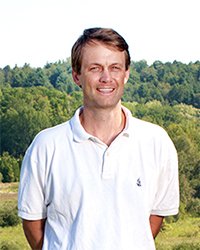
John Stinchcombe
Distinguished Professor of Ecological Genetics & Director, Koffler Scientific Reserve
BA, Bucknell University
PhD Duke University
PostDoc, Brown University
- Phone
- 416-946-5986
- Office
- ESC 2080
- Lab
- ESC 2077
- john.stinchcombe@utoronto.ca
Prospective Students:
I am currently accepting highly motivated new MSc and PhD students to study these research topics. Interested applicants should send a CV and unofficial transcript along with a cover letter summarizing their research interests, academic background, and skills to john.stinchcombe@utoronto.ca
Research
In the Stinchcombe Lab, we study ecological and evolutionary genetics. We are interested in the interaction between natural selection and genetics. For studies of natural selection, we are interested in measuring natural selection, predicting evolutionary change, understanding the ecological agents of selection, and evaluating how selection occurs and changes in natural or field settings. Our genetic work includes studies of classical Mendelian polymorphisms, quantitative genetics, and genomics and transcriptomics. Our goals are to determine when genetic forces will constrain or accelerate evolutionary change, whether we can detect past evidence of selection in patterns of diversity and polymorphism, and attempting to integrate population genetic and quantitative genetic approaches to evolution. We combine field work, lab work, next-generation sequencing, and manipulative experiments, usually working with plants as experimental systems. Most of our work addressing these questions focuses on life history evolution and plant-microbe mutualisms, although we also study other topics such as gene expression, herbicide resistance, invasive species, the evolution of clines, and species range limits.
Click here for a wordle that visually depicts my research topics.
